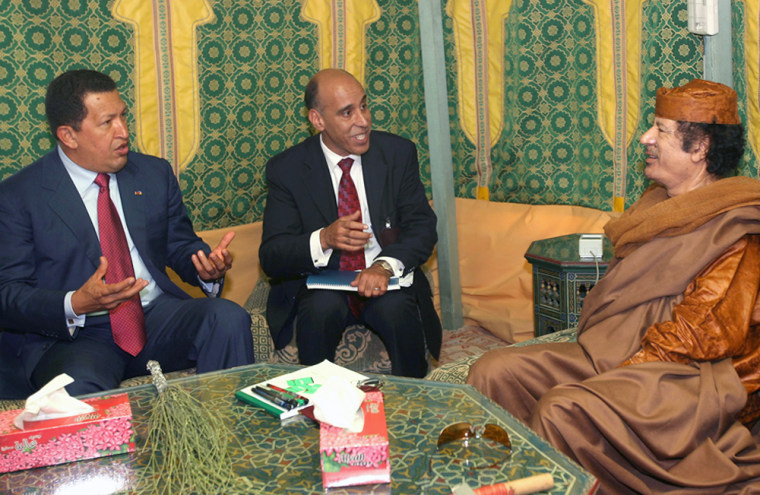Two longtime members of the anti-American camp met Wednesday for talks about the oil market: Libya's Moammar Gadhafi, who's coming from the cold after the U.S. restored relations, and Venezuelan President Hugo Chavez, who's going deeper into the freeze after being hit with a U.S. arms embargo.
Gadhafi, his face partly covered by a large brown scarf draped over his Arab tribal robe, welcomed Hugo Chavez at his house, scarred with bullet holes and showing damage to some of the crenelated concrete at the top of the building from a 1986 U.S. bombing raid.
The two leaders met for about an hour in a tent near the wrecked home, but officials from both sides refused to disclose details of the discussions.
A Libyan Foreign Ministry official, who spoke anonymously because he was not authorized to provide information, said agreements were to be signed later Wednesday when expanded delegations met. He did not elaborate.
Venezuela's state-run Bolivarian News Agency said Chavez was in Tripoli on a two-day visit as part of a tour aimed at strengthening relations with North African nations. Other officials said Chavez would leave the oil-rich North African nation later in the day.
Gadhafi praised Chavez during 2004 visit
It was Chavez's fourth visit to Libya. The last time, in November 2004, Gadhafi presented the Venezuelan leader with his annual Moammar Gadhafi human rights prize, honoring Chavez for helping his country battle "the effects of imperialism and the enemies of freedom inside and outside."
Chavez has referred in the past to Gadhafi as a "hero," harshly criticizing Western nations' actions against him, and held up Libya as a model of democracy at a time when it was regarded by some countries as a state sponsor of international terror.
Chavez at times refers to Gadhafi in his marathon speeches, quoting passages from the Libyan leader's Green Book that lays out his ideology. Chavez defines himself as a socialist and has at times spoken warmly of Gadhafi's attempts to find an alternative to capitalism.
On his arrival at the wrecked Gadhafi home, Chavez wore a suit and stopped to chat with some of those waiting to greet him. A band played the national anthems of both countries.
The two leaders then got into a late-model Cadillac stretch limousine and were driven a short distance to the tent where they held their talks. A herd of camels watched as the big black car drove by with at least 20 security men trotting alongside.
Reported topic: ‘Social programs based on oil revenues’
A Venezuelan official in Tripoli, speaking on condition of anonymity because he was not authorized to speak to reporters, told The Associated Press that Chavez intended to meet with Gadhafi to discuss "social programs based on oil revenues."
He said the global oil market also was on the two leaders' agenda in preparation for the next OPEC meeting June 1 in Caracas. Tripoli has vast oil reserves and U.S.-based oil companies are racing to gain drilling rights after
Washington announced on Monday that it was restoring diplomatic relations with Gadhafi's government and simultaneously removed it from the State Department list of countries that sponsor terrorism.
On the same day, the U.S. announced an arms embargo against Venezuela. Chavez, who was in London, issued a blistering rebuke, saying "this doesn't matter to us at all."
He said his government would not respond with punitive measures such as travel restrictions.
"There's no way we will do that. We will find a solution to this," he said, calling the United States an "irrational empire.
"It's the empire and it has a great capacity to do harm to the countries of the world," he said.
The United States imposed the arms ban because of what it claimed was a lack of support by Chavez's leftist government for counterterrorism efforts, the State Department said.
The next day, Gen. Alberto Muller, an adviser to Chavez, said he had recommended to the defense ministry that Venezuela consider selling its U.S.-supplied F-16 fighter jets because of the ban.
Muller said he thought it worthwhile to consider "the feasibility of a negotiation with Iran for the sale of those planes."
But Defense Minister Adm. Orlando Maniglia said a sale of the 21 F-16s wasn't in the works and Chavez "has not given any order" what to do with the aircraft. He said the United States had violated a contract by refusing to sell Venezuela replacement parts for its jets, even after Venezuela paid for those parts.
"I've honestly grown tired of asking for replacement parts for the F-16s," Maniglia said. "I've got my list. We've paid. We have money deposited in the United States."
